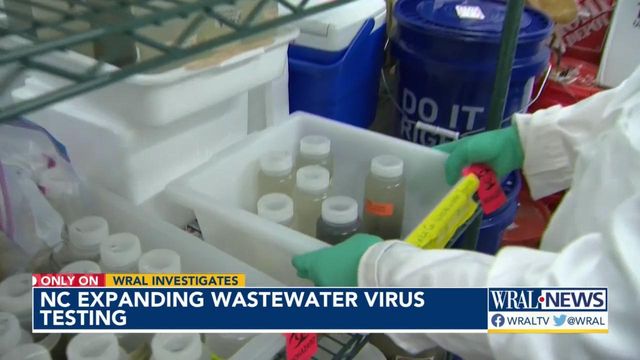North Carolina expands COVID-19 wastewater testing
The North Carolina Department of Health and Human Services is expanding from 24 wastewater collection sites to 37 sites.
Posted — UpdatedThe North Carolina Department of Health and Human Services is adding testing locations across the state to expand its collection of wastewater to be tested to show the presence of disease or illness in a community.
During the pandemic, tests of wastewater were able to show where lots of COVID-19 virus was present in what people flushed. It wasn’t until December 2021 when state health officials say the wastewater data became reliable in helping them predict possible increases in viral spread. The COVID testing success inspired the state to expand from 24 collection sites to 37 sites, and to test for more health risks, like flu.
“People with COVID-19 shed viral particles in their stool,” the NCDHHS website states. “These viral particles are pieces of the SARS-CoV-2 virus, which causes COVID-19 when still intact. In wastewater, the particles are no longer infectious but can still be measured.”
The state used wastewater testing to compliment other metrics during the pandemic.
“It really has developed quite rapidly in a short period of time,” said Dr. Angela Harris, assistant professor in the North Carolina State University department of Civil, Construction, and Environmental Engineering.
Harris further explained how the state uses wastewater testing to monitor COVID-19.
“Using wastewater will still let us survey the population so we can start to see if there is anything particularly concerning that maybe we should start promoting more testing or having pop-up testing in locations,” Harris said.
NC Wastewater Monitoring Network Program Lead Dr. Virginia Guidry explained how wastewater testing helps compliments other metrics and allows the state to keep tabs on changing trends.
“We are really establishing this program first of all for COVID-19 but also building it for the future so that we can use it for other infectious diseases down the road and maybe other uses, as well,” Guidry said.
Harris echoed Guidry’s sentiments on how wastewater testing helps compliment other metrics tracked by the state.
“I am not going to be able to diagnose an individual with wastewater surveillance, but we can kind of keep tabs on what’s going on in the larger sewer shed,” Harris said.
Later this year, the state plans to pilot wastewater testing for the flu. Future possibilities include testing wastewater for other infectious diseases and opioids.
Guidry said the wastewater testing is much cheaper than individual PCR testing and it gives a presentation of an entire community.
Related Topics
• Credits
Copyright 2024 by Capitol Broadcasting Company. All rights reserved. This material may not be published, broadcast, rewritten or redistributed.





